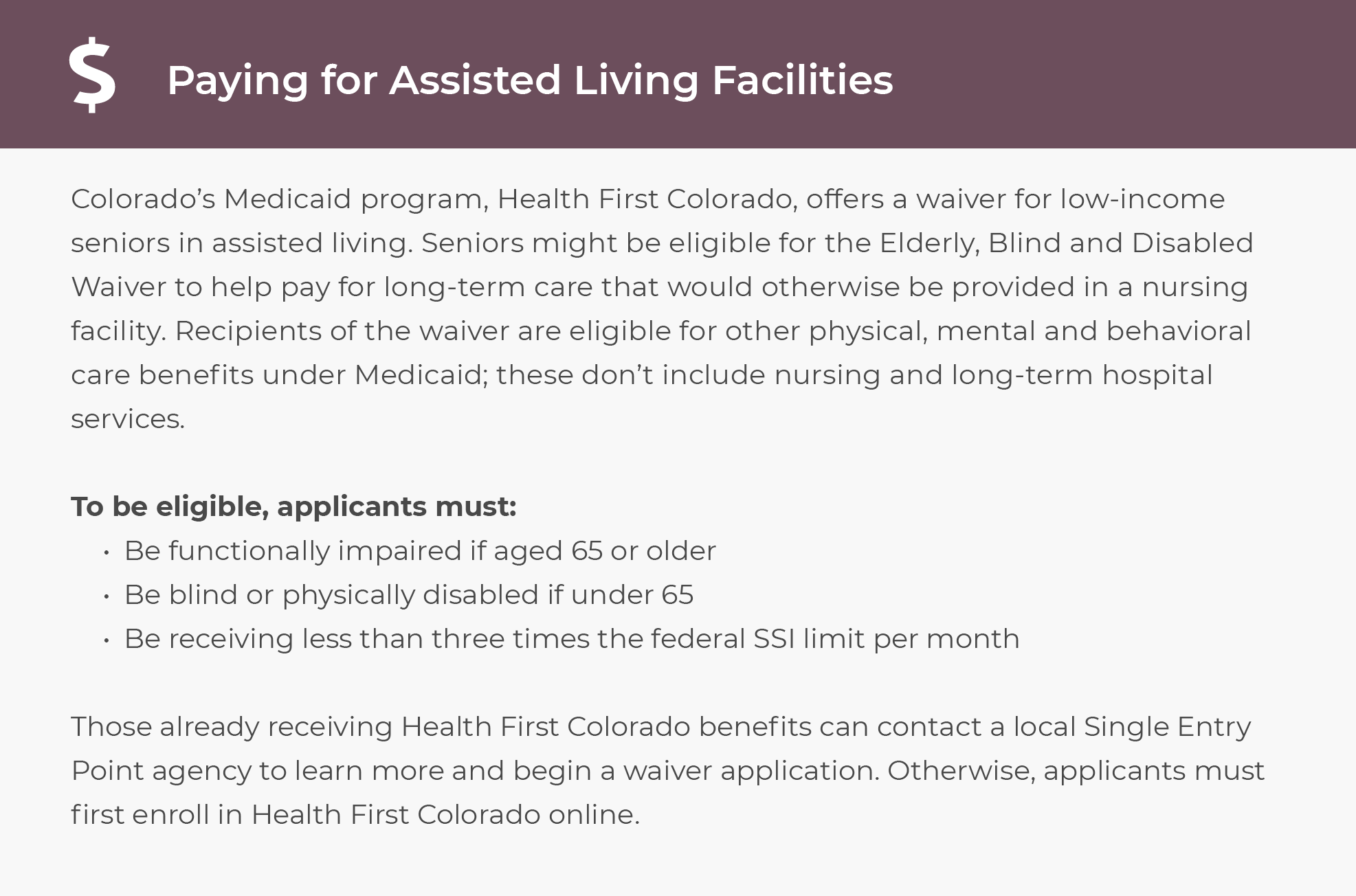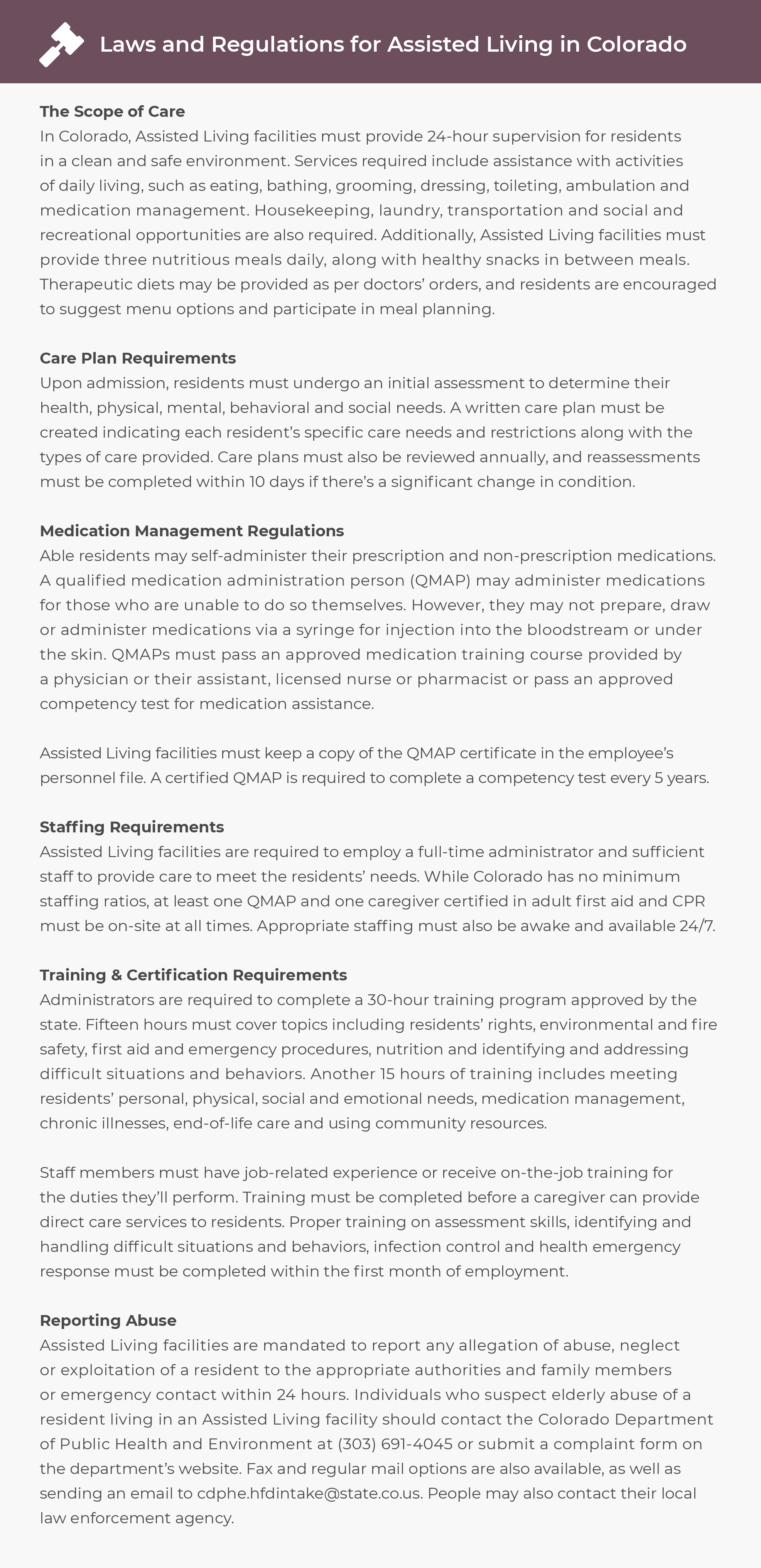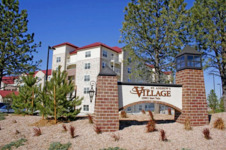Aurora is just minutes outside of Colorado’s state capital, Denver, giving residents ready access to picturesque downtown Denver, an international airport and everything that a large city has to offer. Aurora itself is the third-largest city in Colorado and boasts its own thriving arts and culture scene, such as the Aurora Symphony Orchestra, art exhibits and many local farm-to-table restaurants. Aurora is located at the foothills of the Rocky Mountains, a beautiful area for hiking and nature-watching in the summer and skiing in the winter. The city has a cost of living slightly higher than the national average, although Colorado does offer a retirement income tax break, an added bonus for the many seniors in Aurora, about 11% of the city’s population of 379,000.
Assisted living is best for seniors who can no longer live at home safely, but don’t need continuous medical care. Caregivers at assisted living facilities help with daily tasks such as bathing, dressing and light housekeeping. Assisted living facilities in Aurora cost $5,500 per month, more than the state and national averages.
In this guide you will learn more about assisted living costs, and how to get financial assistance to pay for an assisted living facility. Also included is a list of helpful resources relevant to seniors in Greeley, and the legal requirements that assisted living facilities must follow.
Hundreds of thousands of American seniors utilize assisted living, a figure that is only growing. For these seniors, assisted living combines residential housing,assistance in daily activities, and some healthcare. These communities also strive to provide an atmosphere that is comfortable and engaging for their residents… Read More >
COVID-19 restrictions and rules for Assisted Living Facilities are typically set by the state – to see the rules in your state, you can read our guide to Assisted Living in Colorado. Keep in mind that there may be other policies that communities put in place to protect their residents, so you should contact your local community for more information. Additionally, you can contact your local Area Agency on Aging to learn more – find contact information here.
The average monthly cost of assisted living in Aurora is $5,500, based on data from the Genworth 2021 Cost of Care Survey.
In Aurora, the monthly cost for assisted living averages $5,500. Nationally, assisted living costs $4,500 per month, $1000 less. Colorado’s rates of $4,750 are higher than the national average, but $750 less than Aurora’s prices.
Colorado has a wide variation of assisted living rates. Assisted living in Aurora costs $5,500 each month, but seniors in Boulder pay $775 more with rates of $6,275. Other Colorado cities are more affordable, including Fort Collins and Greeley to the north, and Colorado Springs and Pueblo to the south. Fort Collins’ monthly costs of $4,000 are $1,500 less. Greeley’s rates are $4,400 per month, $1,100 less. Assisted living fees in Colorado Springs are $837 less at a monthly rate of $4,663. Least expensive is Pueblo, which costs $3,800 per month, $1,700 less than Aurora.

Since not everyone can afford to pay for assisted living out-of-pocket, it’s important to find alternative methods to help make assisted living more affordable. Some of these options include:
For more information about your options for making assisted living more affordable, visit our guide to Assisted Living in Colorado.
| Contact | Description | |
| Veterans Affairs Commission – City of Aurora | (303) 739-7087 | The local veterans’ affairs center offers resources for military veterans and their dependents. These include sponsored group therapy for grief and loss, PTSD and caregiver support. Agents at the VA also help veterans apply for VA benefits and connect them with government resources they are eligible for. The agency advocates for veterans’ interests in the city, such as housing, transportation and health care, including mental health. |
| Denver Regional Council of Governments Agency on Aging | (303) 480-6700 | The AAA has comprehensive services to advocate for the elderly in the community and protect their interests. AAA agents lobby for laws and regulations that protect the elderly from abuse and neglect. Other programs include caregiver support and programs to help seniors retain their independence in the community, such as caregiver training, and support and assistance applying for benefits. |
| Colorado Department of Human Services Long-Term Care Ombudsman | (303) 480-6734 | This program protects the rights of those in long-term care facilities and investigates complaints on behalf of residents and their families. Ombudsman representatives also advocate for the interests of the elderly at the local and state levels. |
| Colorado Legal Services | (303) 837-1313 | Area lawyers provide pro bono services for seniors who meet certain income guidelines. Most representation is in civil matters and cases of elder abuse. Attorneys can also draft legal documents such as wills and represent seniors in cases of bankruptcy and divorce. |
| South Metro Medical Equipment Loan Closet | (720) 443-2013 | Area seniors may borrow durable medical equipment, such as toileting chairs, TTY equipment, manual wheelchairs, canes and walkers. The loan closet relies on donations, so the equipment selection can vary. |
| Aurora Senior Services Associates | (630) 897-4035 | This agency develops programs to meet a variety of needs for seniors in the community. These programs include transportation assistance, help obtaining government benefits and meal assistance to meet the physical needs of area seniors. Community celebrations and sponsored games and fitness classes help seniors develop friendships and reduce isolation. |
| Aurora Center for Active Adults | (303) 739-7950 | The senior center organizes games and events for members, including bingo and bridge tournaments, gentle fitness classes and birthday parties. The center also has space for general socialization. |
Assisted Living Facilities in the Aurora area are required to follow a set of rules and regulations that are determined at the state level. For an overview of those rules and regulations, see the information below. For more specific information, talk with your local community or Area Agency on Aging.



























